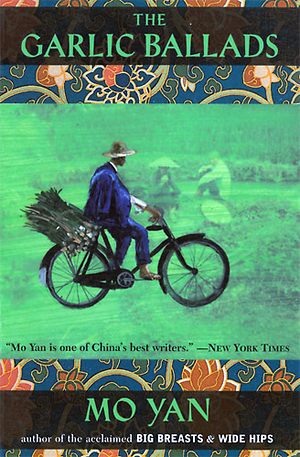Apr 19, 2024
Apr 19, 2024
 On 11 October 2012, the Swedish Academy announced that Mo Yan had received the Nobel Prize in Literature in which "hallucinatory realism merges folk tales, history and contemporary". Aged 57 at the time of the announcement by the Nobel Committee, Mo Yan wasthe 109th recipient of the award and the first ever resident of mainland China to receive it. He wrote eleven novels, all remarkable in the realistic picturisation take the readers to China within.
On 11 October 2012, the Swedish Academy announced that Mo Yan had received the Nobel Prize in Literature in which "hallucinatory realism merges folk tales, history and contemporary". Aged 57 at the time of the announcement by the Nobel Committee, Mo Yan wasthe 109th recipient of the award and the first ever resident of mainland China to receive it. He wrote eleven novels, all remarkable in the realistic picturisation take the readers to China within.
Many exaggerate the similarity between Gabria Garcia Marquez and Mo Yan on the basis of magical realism. It is purely his own innovation that gradually adds to his dignity as a writer. The famous translator of Mo Yan’s books Howard Goldblatt, who selected his novels among thousand such write ups in Chinese every year rightly, wrote: “The basis for his books” was laid when as a child he listened to the folktales.” His writings both novel and short stories show him to be an extremely original narrator.
Mo Yan remains a serving officer in the People’s Liberation Army, while writing apparently subversive literature. His novel The Garlic Ballads was banned in China and the great irony today is that he is today known all over the world as the author of mainly these two great novels Red Sorghum and The Garlic Ballads. Howard Goldblatt's translation introduced him to the readers of the West.
 Mo Yan prefaces The Garlic Ballads with a quotation from Stalin: “Novelists are forever trying to distance themselves from politics, but the novel itself closes in on politics. Novelists are so concerned with “man’s fate” that they tend to lose sight of their own fate. Therein lies their tragedy.” In both these two novels, Mo is the novelist of the countryside and may be called the Hardy of China. But while Hardy in his Wessex avoids politics, nearly all the eleven novels of Mo Yan are highly political. He depicts the violent and haunting picture of the rural society.
Mo Yan prefaces The Garlic Ballads with a quotation from Stalin: “Novelists are forever trying to distance themselves from politics, but the novel itself closes in on politics. Novelists are so concerned with “man’s fate” that they tend to lose sight of their own fate. Therein lies their tragedy.” In both these two novels, Mo is the novelist of the countryside and may be called the Hardy of China. But while Hardy in his Wessex avoids politics, nearly all the eleven novels of Mo Yan are highly political. He depicts the violent and haunting picture of the rural society.
The most important aspect in Mo’s writings is the vulnerability of the poor peasants in the face of corrupt and incompetent officials. The picture of corruption co-exists with the picture of heroic fight of the peasants with the tame less soil and natural adversities. In The Garlic Ballads, the peasants brave the ruin and fight back the arrogant administrators when the staunch smell of rotting garlic becomes unbearable for them. What is heart touching is the tragic melody of the blind musicians who give vent to the sorrows of the peasants in his ballads.
The Garlic Ballads which is the Chinese equivalent of The Sound and the Fury or Hundred Years of Solitude are chiefly about the plight of the farmer and the destitute. Mo, who is the Chinese Dickens, cuts rapidly between locations and times, but never too rapidly, striking a perfect balance between forwarding the plot and drawing back to offer perspective on the goings on. In this novel, there is clearly an imbalance of power, and the exploitation of the poor and the powerless by the connected and wealthy, but the oppressed are hardly saints. They, who are, people with their own shortcomings and prejudices, are trapped within a ruthless official system. Mo Yan shows the true power of an artist by diving into the actuality of his characters to make them empathic and flawed.
The Garlic Balladstells the tale of a group of Chinese peasants whose lives are dependent upon selling their garlic crop; when harvests exceed governmental estimates, officials curb the amount of garlic that can be brought to market, setting off a violent chain of events. Against this backdrop, Mo weaves presents three stories: that of two lovers, which dominates the novel, as well as a familial conflict and the relationship between two friends; the prose is nearly flawless.
Set in rural China, The Garlic Ballads explores the misfortune of ordinary Chinese farmers during the post revolutionary period. The very title which focuses on the word ‘Ballads’ reveals that it is a love story in particular spiced by magic realism. The harrowing experiences make the stuff of the novel. The small dramas of the Gao and Yang families, set against a slightly larger but nonetheless miniscule backdrop of rural corruption gets steadily deeper as it progresses, illuminating the There are two boys and one girl in the Fang family. The elder son is crippled and it has therefore been impossible to find him a wife, although marriage is still an imperative for everyone in the Chinese countryside. Moreover, marriage for the younger son is inappropriate while his elder brother remains single.
Mo focuses on the paradoxes of modern China and the unchanging demands of love, family, and duty. There are also other heterogeneous elements - an arranged marriage, a botched directive from central agricultural planners, and a drunk driver with government connections. All are woven into a coherent whole through the poetic vision of Mo Yan who easily peddles in realism. A brave defense offered by a young army officer who perhaps represents the author’s voice of reason, the ringleaders are sentenced to terms in a labour camp. The Garlic Ballads is banned in China although the Random House is ready to publish it his winning of the Nobel Prize.
From Garlic to Mo Yan proceeds to the distilled white spirits which are produced all over China beside the production of opium. In the Republic of Wine, “Special Investigator” Ding Gou’er is sent to investigate stories of cannibalism, the rearing of infants for the table, near the Mount Luo coalmine. His investigation becomes a violent nightmare of excess: sexual, alcoholic and culinary. The Republic of wine is suggestive of his unique craftsmanship.
In the best of these stories, Mo Yan shows himself a real heir to Lu Xun, a fine Chinese writer deeply concerned with the fate of his fellow men.“Alcohol”, “Meat Boy”, “Donkey Avenue” and “Ape Liquor” like “Bon appetite! Cheers!” are multi -layered satires on corruption, and the place that food and drink play in corruption in China. Cannibalism which was widely used, most famously by Lu Xun, to demonstrate the “man-eating” despotism of the past is an interesting aspect of the Chinese tradition. It suggests in modern times the political feuds, the metaphor being retranslated into reality with people gaining power. “Soaring”, the story of Yanyan, forced into a complex arranged marriage in which she is effectively offered in part-exchange for her mute brother who marries her new sister-in-law, owes much to magical realism, an influence that Mo Yan has acknowledged elsewhere.
Mo Yan creates a realistic picture of those left behind in today’s get-rich-quick China, people who are too strongly formed by the past to compete. Other stories, like “Iron Child”, reflect the famines of the early 1960s, when Mo Yan, as a child, ate bark and coal. In “The Cure”, he resurrects the theme of a story by Lu Xun. A more satisfying story is “Abandoned Child”, where, rather than looking to Latin America, Mo Yan invokes Chinese folk magic. Foxes were traditionally believed to possess malevolent magical powers, often assuming the guise of beautiful girls, luring young men to disaster. Here, an old man rescues a wounded vixen, only to see her shot by his son, a battalion commander in the People’s Liberation Army.
In filling his historical novel with women having big breasts and wide hips, Mo Yan has a serious, politically subversive purpose in mind. He is highly critical of the authoritarian facade of Communist China as he voices a barely veiled protest against the failures of China’s oppressive male dominated administration. Until it reaches the Communist period, Mo Yan’s attempt to rescue modern China from the bland platitudes of historical propaganda is very clear. In his stories and novels Mo Yan avoids the standard histories of the period. He never minces words in depicting the foreign invaders, communist liberators, and bandits who tear the country apart and all these happen in an entirely localized Chinese world.
Image of Mo Yan (c) Gettyimages.com
16-Oct-2012
More by : Dr. Ratan Bhattacharjee

|
Let us see what is going to happen to him. Possibly, he would be landing in a jail soon for writing these subversive zzz articles and books. He soon will be forgotten. KamathH |

|
thank you Seemaji amn Vaseem Kureshi for your appreciation |

|
A very informative and nice article on the recent Nobel winner writer. Thanks a lot. |

|
kudos to the venerable MO YAN for getting this well deserved honour and to RATTAN DA for making us all aware of the GARLIC BALLAD and MO YAN's poetic ingenuity. |